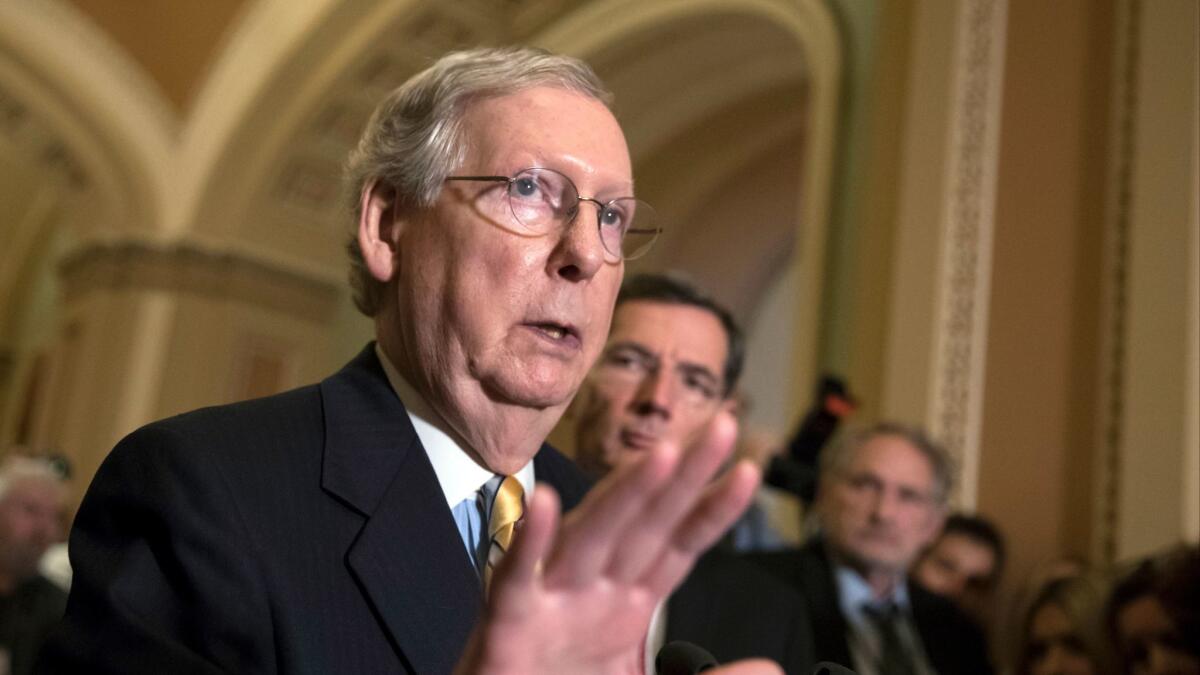Column: A tattered band-aid: Senate GOP’s $200-billion Obamacare cushion would run out in two years

As Senate Republicans rush pell-mell toward a Tuesday vote on an Obamacare repeal bill that most, if not all, still haven’t seen, a new study examines one of the givebacks the GOP leadership has offered anti-repeal senators to bring them on board.
The sweetener is a $200-billion fund for the 31 states that expanded Medicaid under the Affordable Care Act, to be paid out starting in 2022. Since the GOP bill would eliminate the Medicaid expansion, the ostensible idea is to help them cushion health insurance costs for those states and their Medicaid enrollees forced to transition to the ACA’s individual insurance exchanges.
Few objective analysts think the $200 billion fund would provide much of a cushion, since the measure published by the Senate GOP — known as the Better Care Reconciliation Act — would cut more than $700 billion out of federal Medicaid funding over 10 years. But the new study, released Monday by the Urban Institute, finds that the $200 billion would cover those transition costs for barely two years.
Your money or your life is not a choice.
— Insurance expert David Anderson
That would still leave the former Medicaid enrollees, who are among America’s lowest-income households, on the hook for higher insurance costs.
Even as the cushion runs out, the Urban Institute observes, “the loss of federal dollars devoted to the Medicaid program would be permanent.” That would present states with a sheaf of unpalatable options, including cutting Medicaid benefits or throwing more people out of the program.
The finding underscores the quandary faced by repeal advocates in the Senate Republican leadership. Several GOP senators from Medicaid expansion states, including Susan Collins of Maine, Lisa Murkowski of Alaska and Shelley Moore Capito of West Virginia have said they won’t vote for a repeal measure that slices so deeply into the expansion. Others, including Dean Heller of Nevada and Rob Portman of Ohio, are under intense pressure from the Republican governors of their home states to resist the cuts.
That forced Senate Majority Leader Mitch McConnell of Kentucky to drop from the repeal bill two long-cherished tax cuts for the wealthy, in part to provide funds for the $200-billion sweetener. (McConnell also may have been responding to the awful optics of slashing healthcare for the poor in order to provide tax cuts for the rich.)
McConnell has said that a procedural vote on the Better Care Reconciliation Act will be held Tuesday, despite mounting problems with the bill. Among other problems, the Senate parliamentarian ruled last week that many of its provisions are subject to a filibuster, which means they’d require 60 votes to pass. Since Republicans have only 52 votes in the chamber — counting that of Sen. John McCain, R-Ariz., who is out indefinitely following brain surgery — those provisions are clearly dead. They include defunding of Planned Parenthood and other provisions aimed at keeping extreme conservatives on board.
In analyzing the $200-billion giveback fund, health insurance experts at the law firm Manatt, Phelps & Phillips earlier raised “significant questions about whether sufficient BCRA pool and waiver funding could be patched together” to provide “in all 31 expansion states a broad-based coverage solution that is comparable in benefits and affordability to coverage under the ACA.” The Urban Institute paper answers those questions with a resounding “no.”
The paper estimates that the higher premiums, deductibles, and other out-of-pocket costs likely to result from the BCRA would drive 90% of the people covered by Medicaid expansion — 12 million out of the 13.3 million covered — clear out of the insurance market. Among other things, the repeal measure would result in a $13,000 deductible per person in a benchmark ACA plan by 2026, according to the Congressional Budget Office. Since Medicaid expansion covers people earning up to 138% of the federal poverty level, or $16,640, a deductible equivalent to nearly 80% of income is tantamount to no insurance at all, and almost no one would buy it. As insurance expert David Anderson of Duke comments, “Your money or your life is not a choice.”
The $200-billion fund is aimed at helping that population. The Urban Institute calculates that providing the transitional group with premium subsidies would cost $17.4 billion by 2022; covering their deductibles and co-pays $33.6 billion; and paying their claims $19 billion. Those costs and others would come to just over $76 billion in 2022. If the expansion states opt to roll back expansion, the costs would come to $100.7 billion that year. In either case, the cost would rise every subsequent year.
In other words, at best the $200 billion would cover a bit more than two years of higher costs for Medicaid patients and their states. There’s a technical term for what Collins, Murkowski, et. al. are being offered: “A pig in a poke.”
Keep up to date with Michael Hiltzik. Follow @hiltzikm on Twitter, see his Facebook page, or email michael.hiltzik@latimes.com.
Return to Michael Hiltzik’s blog.




